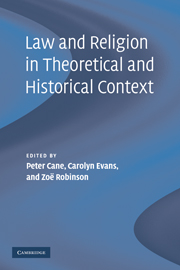Book contents
- Frontmatter
- Contents
- List of Contributors
- 1 Introduction
- 2 The moral economy of religious freedom
- 3 Understanding the religion in freedom of religion
- 4 Why religion belongs in the private sphere, not the public square
- 5 Pluralism in law and religion
- 6 The influence of cultural conflict on the jurisprudence of the religion clauses of the First Amendment
- 7 From Dayton to Dover: the legacy of the Scopes Trial
- 8 A very English affair: establishment and human rights in an organic constitution
- 9 Days of rest in multicultural societies: private, public, separate?
- 10 Australian legal procedures and the protection of secret Aboriginal spiritual beliefs: a fundamental conflict
- 11 Secular and religious conscientious exemptions: between tolerance and equality
- 12 Law's sacred and secular subjects
- 13 Freedom of religion and the European Convention on Human Rights: approaches, trends and tensions
- Index
- References
13 - Freedom of religion and the European Convention on Human Rights: approaches, trends and tensions
Published online by Cambridge University Press: 07 July 2009
- Frontmatter
- Contents
- List of Contributors
- 1 Introduction
- 2 The moral economy of religious freedom
- 3 Understanding the religion in freedom of religion
- 4 Why religion belongs in the private sphere, not the public square
- 5 Pluralism in law and religion
- 6 The influence of cultural conflict on the jurisprudence of the religion clauses of the First Amendment
- 7 From Dayton to Dover: the legacy of the Scopes Trial
- 8 A very English affair: establishment and human rights in an organic constitution
- 9 Days of rest in multicultural societies: private, public, separate?
- 10 Australian legal procedures and the protection of secret Aboriginal spiritual beliefs: a fundamental conflict
- 11 Secular and religious conscientious exemptions: between tolerance and equality
- 12 Law's sacred and secular subjects
- 13 Freedom of religion and the European Convention on Human Rights: approaches, trends and tensions
- Index
- References
Summary
Introduction
The purpose of this chapter is to offer an overview of developments within the jurisprudence of the European Court of Human Rights relating to the freedom of religion which are giving rise to difficulties, and to offer some general suggestions for how they might be resolved. The underlying message is that human rights law regarding the freedom of religion in Europe today is developing in a fashion which is as likely to hinder as it is to assist the realisation of the goals of tolerance and religious pluralism which are said to be what it is seeking to achieve. The reason for this is that the European Court has shifted its focus away from the right of the individual and towards the role of the state in matters of religion, and in the process has endorsed a form of ‘neutrality’ which is potentially at odds not only with aspects of religious liberty itself but also with long-established models of church-state relations. It is not, however, a case of ‘either/or’. In its more recent judgments both tendencies continue to interact with each other, but it seems that the court is not yet getting the balance right and this will continue to cause difficulties unless or until the problems are identified, analysed and corrected.
After exploring a number of preliminary issues, the second section of this chapter will look at what might be called the ‘individual’ approach to the freedom of religion.
- Type
- Chapter
- Information
- Law and Religion in Theoretical and Historical Context , pp. 291 - 316Publisher: Cambridge University PressPrint publication year: 2008
References
- 4
- Cited by



